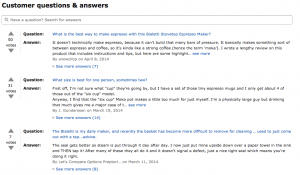Joe is Head of Content for British digital marketing agency, Bespoke Digital. He has written extensively on SEO, digital marketing and social media (amongst other things).
In November of this year a British couple were fined 100 for posting a negative review on the Trip Advisor website after their stay in a Blackpool hotel. The audacity of the fine didn’t escape the national press who soon picked the story up and before the hotel manager could say ‘PR disaster’, there was Tony and Jan Jenkins sat in a BBC studio telling their story on national television.
Although this is somewhat of an extreme example of how not to handle a negative review (the clause in the hotel’s booking agreement relating to the imposition of a fine may well have breached British trading standards) there are lessons we can take away from such an unmitigated PR disaster as this. Perhaps the most glaring is that, in an age of mass social media engagement and running public commentary, many small business owners still haven’t learnt the basics of good PR and reputation management.
(For more on how even negative reviews boost conversions, click here)
Whilst it may be too late for our hapless Blackpool hotel manager, let’s take a look at the essentials when dealing with negative reviews.
Knowing Your Options
Broadly speaking there are three weapons you have in your armoury for dealing with and managing negative reviews:
1. Contacting the Review Site
2. Joining the Conversation
3. Reputation Management
Reputation management differs from the first two options in that it is a proactive approach. We’ll cover this in more detail later but for now I want to focus on the first two.
Joining The Conversation
Contacting the review site might not be an option if the review is legitimate and given that the modus operandi of review sites is to publish reviews, then chances are that there’s not much you can do on this front. If you feel that the review is unduly harsh or, more importantly, contains erroneous or misleading information then you may have a case though.
get involved
in
the conversation
as soon as possibleWhen small business owner, Merrily Rocco’s wedding design firm was attacked in two reviews on Yelp, she contacted the site to have the reviews taken down. Yelp refused as the reviews didn’t breach its policies, but they did remove a third review that was found to have been posted by a competitor.
(To learn how to monitor for reviews, click here)
Rocco’s experience highlights a worrying possibility though, which is that it’s wholly possible that unscrupulous competitors may try to take advantage of bad press by joining in, blowing it out of proportion, or even whipping up controversy in the first place. If you believe this is happening to you then contacting the review sites through the proper channels is your first port of call.
Tactics To Join The Conversation
If the negative review is genuine, then it’s important that you get involved in the conversation as soon as possible. There are four tactics you should implement when start responding to negative reviews:
1. Understand Your Audience:
Doing some research on the review site or forum where the criticism first appeared is essential. Some sites may have a userbase that are prone to using sarcasm, humour or even winding people up. Some review sites are deadly serious. Understanding this from the offset may could save you a lot of embarrassment or getting taken down for a ride.
2. Apologise:
‘The customer is king’ is a phrase that isn’t as frequently used as it was but it still holds true on the open forums that is social media. Apologising from the outset doesn’t have to mean accepting culpability either, but more often than not it can take the wind out of the sails of any disgruntled customer. If you got it wrong then it’s important to say you got it wrong but if you didn’t then it’s also fine to say that you’re sorry the complainant feels the way they do and follow it up by asking what you could have done better.
3. Try To Resolve The Problem:
It’s easy to forget when you’re being attacked on a public forum that the customer is the lifeblood of your business. Whether you like it or not, people take heed of negative reviews so even if someone appears to be unjustifiably attacking your beloved company, try to first identify their problem and then seek to resolve it. If you’re openly offering to help someone resolve their problem and they continue to moan then you will invariably end up being viewed more favourably. Gaining and maintaining the high ground is really what this is all about at the end of the day. Whatever you do don’t get defensive or aggressive and never respond to reviews if you’re angry or incensed.
4. Turn A Negative Into A Positive:
Negative reviews can paradoxically present your business with a perfect PR opportunity  . If you can’t resolve the problem and you are in the wrong (or could plausibly be seen to be in the wrong) then a token of goodwill can do wonders for your image. Most importantly though it’s about the language you adopt, the attentiveness you give the complaint and how sorry you come across that you haven’t met someone’s expectations. Acting both surprised and disappointed is an extremely powerful way of projecting the value your business puts it in your customers.
. If you can’t resolve the problem and you are in the wrong (or could plausibly be seen to be in the wrong) then a token of goodwill can do wonders for your image. Most importantly though it’s about the language you adopt, the attentiveness you give the complaint and how sorry you come across that you haven’t met someone’s expectations. Acting both surprised and disappointed is an extremely powerful way of projecting the value your business puts it in your customers.
Reputation Management
Reputation management is as much about damage limitation as it is about firefighting. At its heart is a combination of good PR, Social Media Management and SEO.
A powerful social media presence with a strong following will allow you to react quickly to complaints on your owned or earned media. This affords you a degree of control. Complaints made on these forums can be monitored and dealt with quickly before they get out of hand. What’s more, with a solid and strong social media following, any nuisance or serial complainants will quickly be identified and silenced by your own community of followers (who obviously like your brand enough to have become your follower). This isn’t so easy with orchestrated or guerrilla campaigns such as the one by Greenpeace targeting VW on Facebook. VW’s response to delete comments is another example of what not to do in the face of negative commentary.
Another strand of reputation management is the utilisation of SEO tactics to dominate the SERPs in times of negative publicity. Whilst it can be very hard to stand up against the power of the press in particularly disastrous situations, being able to dominate the top results on a given search term with websites, blogs and social media accounts you control, can effectively push any sites you don’t have control over down the agenda and help to hide or bury the story to a degree. It’s important to note that this tactic is not an alternative to dealing with negative reviews and in the past has been manipulated by unscrupulous SEO tactics like creating and optimising multiple blogs on potentially negative search terms that could be associated with your company at a future date. Suffice to say that with the ubiquity of social media, this tactic is less effective than it once was.
Now read: 10 Experts on Getting Negative Links Off Page One
A Level Playing Field?
In the world of reputation management there’s an advantage to being big. Being able to command huge budgets and entire teams to monitor, manage and deal with negative reviews can put large corporations at a distinct advantage over smaller businesses. What’s more, the loss of one loyal customer, or even a couple of hundred, just isn’t that damaging to larger wealthy companies. On the flipside though, a small business may be dependent on a small customer base and one negative review could spell disaster.
Whilst all this does seem to suggest that the rules are tipped in favour of big business when it comes to coping with negative reviews, there is another factor to consider and that’s the level of scrutiny that big businesses come under, not just from the press but from the public at large. With the advent of mass social media engagement across much of the world, it’s harder than ever to bury negative commentary or switch off from the debate.
The democratising nature of the internet, and social media in particular, has engendered a new level of scrutiny from an increasingly savvy and diligent public, which has helped to redress the balance between big corporates and the little guys. Whether this has created a totally level playing field in terms of reputational fragility is another issue. I’ll let you be the judge of that.
If you liked this post, you might also enjoy How to Encourage User Reviews: Tips for Small Business
How to Deal With Negative Reviews
Written by Joe Cox, Bespoke Digital.
The post How to Deal With Negative Reviews appeared first on Search Engine People Blog.
(412)






